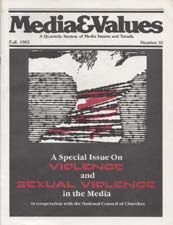Testimony Reveals Complexity of Sexual Violence Issue in Media
|
This article originally appeared in Issue# 33
|
Panel seeks out diverse voices to better understand who's responsible and who can make a difference.
In 1982, in an effort to better understand the growing complexity of the entertainment culture in relation to the portrayal of violence in the media, especially violence against women, representatives of community and religious organizations,convened by the National Council of Churches, held hearings in New York and Los Angeles to hear first person from those in the industry. Over and over testifiers emphasized their status as small parts of a vast and complex system designed to parcel out responsibility, a little bit to everyone, so that in the end no one is ultimately accountable. Here is a sampling of their comments
Sen. Paul Simon, (D) Illinois:
"The evidence appears overwhelming that witnessing violence on television contributes to violent behavior in real life. There may be isolated instances of individuals who repeat a violent image. But the major problem is the child who sees it day after day and becomes confused about the consequences of violence in a TV world in which the good guys are rarely hurt or killed and the 'bad guys' aren't always identified.
Barry W. Lynn, American Civil Liberties Union:
"The real media problem today is the continuing absence of genuine diversity. Most women portrayed in Dallas are role models I do not want my daughter to emulate. But that does not trouble me half as much as the difficulty of finding her alternate models. . .
. . .Phrases like "gratuitous violence" and "sexually exploitative material" are not likely to prove helpful. They are simply too ambiguous. One person's "gratuitous" exploitation is another's core artistic expression. In addition, the First Amendment does not require that material be designed to serve any socially useful purpose. The First Amendment may not be suspended because an image or an idea causes the most susceptible or most malleable person who hears it or sees it to behave in an anti-social manner. . .
. . .The NCC has every right to critique the moral and aesthetic value of any image in the marketplace. You have the right to insist that broadcasters who are statutorily required to operate in the public interest present many different views. But if you cannot persuade persons to reject that which you consider exploitative or unhealthy, do not ask government to impose your will on those same persons.
George Gerbner, Annenberg School of Communications / Philadelphia:
A handful of production companies create the bulk of the programs and sell them to broadcasters, not to viewers. The cheapest and least offensive programming is the most profitable, but the costs of such programming, like taxation, are borne by all, whether or not they use the product advertised. You pay when you wash, not when you watch.
Christine Foster, Group W Productions:
Mainstream, legitimate network and production company executives, producers, writers and directors are, like you, conscientious citizens, family people, mothers and fathers. We are conscious of the effects we have on the public and on our communities. I think that the public is exposed to too much gratuitous violence and too much exploitative sex. I'm particularly concerned with the depiction of violence and disrespect against women. But studio executives are intelligent, brutally overworked men and women who share one thing in common with baseball managers: they wake up every morning with the knowledge that sooner or later they're going to get fired. They report to executive vice presidents who report to senior vice presidents who report to presidents who report to group presidents who report to the chairman of the board, who report to stockholders who report to the IRS, who, I guess, report to God.
Roxanne Bradshaw, National Education Association
We all have a responsibility to get involved. We're not interested in censorship. We're interested in re-educating ourselves and our children about electronic media. It's extremely important that we distinguish what is reality and what is fantasy early on in a child's viewing. Children are an especially vulnerable audience and must be protected. Society should be concerned with addressing the problem of TV violence, race and sex stereotypes and exploitation by advertisers. Parents must learn to exercise oversight on their children's viewing by such means as asking them questions about what they watch, encouraging them to distinguish the differences between reality and television illusion, helping them read TV programming guides found in newspapers and magazines and watching programs with them.
Nicholas Van Dyke, National Council for Families and Television
Violence on television reflects the widespread violence prevalent in our society. It forces us to acknowledge the skeletons in our societal closet. We decry violence on a Kojak rerun but remain silent about poverty, invasion and the threat of nuclear annihilation.



